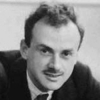Paul Dirac

Paul Dirac
Paul Adrien Maurice Dirac OM FRSwas an English theoretical physicist who made fundamental contributions to the early development of both quantum mechanics and quantum electrodynamics. He was the Lucasian Professor of Mathematics at the University of Cambridge, a member of the Center for Theoretical Studies, University of Miami, and spent the last decade of his life at Florida State University...
ProfessionScientist
Date of Birth8 August 1902
discovery people progress
Just by studying mathematics we can hope to make a guess at the kind of mathematics that will come into the physics of the future ... If someone can hit on the right lines along which to make this development, it m may lead to a future advance in which people will first discover the equations and then, after examining them, gradually learn how to apply the ... My own belief is that this is a more likely line of progress than trying to guess at physical pictures.
successful discovery needs
It was not until some weeks later that I realized there is no need to restrict oneself to 2 by 2 matrices. One could go on to 4 by 4 matrices, and the problem is then easily soluable. In retrospect, it seems strange that one can be so much held up over such an elementary point. The resulting wave equation for the electron turned out to be very successful. It led to correct values for the spin and the magnetic moment. This was quite unexpected. The work all followed from a study of pretty mathematics, without any thought being given to these physical properties of the electron.
bare cannot electron imagine piece since string theory
In such a theory a bare electron would be inconceivable, since one cannot imagine the end of a piece of string without having the string.
discrete electric field lines physical picture treated
The electric field in this picture from discrete Faraday lines of force, which are to be treated as physical things, like strings.
book math physics
A book on the new physics, if not purely descriptive of experimental work, must essentially be mathematical.
country different culture
It is quite clear that beauty does depend on one's culture and upbringing for certain kinds of beauty, pictures, literature, poetry and so on...But mathematical beauty is of a rather different kind. I should say perhaps it is of a completely different kind and transcends these personal factors. It is the same in all countries and at all periods of time.
chemistry physics mechanic
Quantum mechanics has explained all of chemistry and most of physics.
strong thinking ideas
I think it is the general rule that the originator of a new idea is not the most suitable person to develop it, because his fears of something going wrong are really too strong... At age 69.
math practice data
The physicist, in his study of natural phenomena, has two methods of making progress: (1) the method of experiment and observation, and (2) the method of mathematical reasoning. The former is just the collection of selected data; the latter enables one to infer results about experiments that have not been performed. There is no logical reason why the second method should be possible at all, but one has found in practice that it does work and meets with reasonable success.
communication people speak
There are always more people who prefer to speak than to listen.
needs reason-why example
Theoretical physicists accept the need for mathematical beauty as an act of faith... For example, the main reason why the theory of relativity is so universally accepted is its mathematical beauty.
simple two way
The aim of science is to make difficult things understandable in a simpler way; the aim of poetry is to state simple things in an incomprehensible way. The two are incompatible.
views mathematical-equations progress
It seems that if one is working from the point of view of getting beauty in one's equations, and if one has really a sound insight, one is on a sure line of progress
science opposites people
In science one tries to tell people, in such a way as to be understood by everyone, something that no one ever knew before. But in poetry, it is the exact opposite.